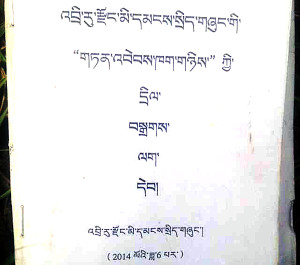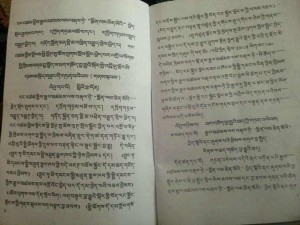County government in eastern Tibet announces new laws and punishments for native Tibetans
DHARAMSALA, July 28: A county government in eastern Tibet has published a new manual in Tibetan language containing new laws and respective punishments in an effort to threaten and discourage Tibetans in the county from protesting against Chinese rule in Tibet and other activities deemed dangerous by China’s communist government.
According to a source, the county government of Driru in Nagchu prefecture of former Kham province of Tibet published and distributed a manual titled “ Driru Zong Mi Mang Sizhung Gi Ten Beb Khag Nyi ki Drildak Lag Dheb” (Eng: Two-part manual announcing laws established by the people’s government of Driru county) in June this year.

The manual containing four chapters and 26 articles lays down new sets of prohibitions and requires Tibetans to struggle against “separatist” and the Tibetan spiritual leader, His Holiness the Dalai Lama. The manual prohibits Tibetans from participating in Kalachakra Initiations given by His Holiness the Dalai Lama, singing songs in praise of the Tibetan spiritual leader, criticizing and mocking policies of the Chinese Communist government, circulating in Tibet arbitrary “rumours” spread by “separatists” based outside Tibet, organizing public talks and discussions in the county and prohibits monks and nuns in Tibet Autonomous Region (TAR) from studying in monasteries and institutions in Tibetan populated areas located outside TAR.
The manual further announces various forms of punishments for those who go against the new laws. The punishments include 3 to 6 months of political education, one to ten years ban from harvesting catipillar fungus (Yartsa Gunbu) and even arrests and jail term depending on what kind of rule a person has broken.

According the source, before and after this year’s catipillar harvesting season (which falls around April), around 100 Tibetans have been detained and sentenced under various unfounded reasons. Many of them are still languishing in detention centres and prisons. Some have been disappeared for 8 to 9 months since their arrests and their families are still struggling to gain information about their whereabouts and condition.
For most part of last year, Driru county has been a hotbed for Tibetan protests against Chinese rule and the subsequent crackdown that followed the protests resulted in beatings, detentions and arrests of hundreds of native Tibetans. Since September, 2013 around 15 known Tibetans from Driru county have been sentenced to jail terms ranging from two and half years to 18 years.
Since last year’s caterpillar fungus harvesting season, all communication lines including phone and internet have been locked down in Driru county making it extremely hard to gather detailed information from the area.




